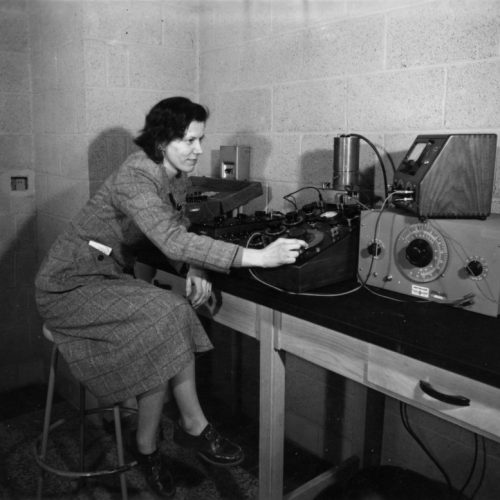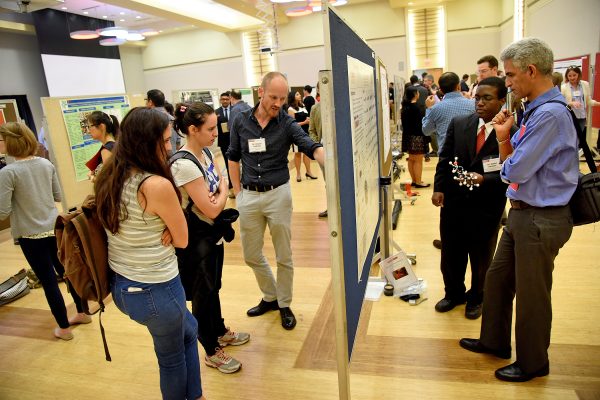Diversity, Equity, and Inclusion

Nothing in life is to be feared, it is only to be understood. Now is the time to understand more, so that we may fear less.
Dr. Marie Curie
Our Diversity Statement
In the spirit of Marie Curie, NC State’s Materials Science & Engineering Department commits to fundamental understanding not only in science but also in human experience. We ground ourselves to understand how to create an environment of inclusion, belonging, and community. We welcome and celebrate all forms of diversity: gender, sexuality, disability, age, socioeconomic status, ethnicity, race, culture, and other forms of diversity not mentioned. As scientists and engineers, we will work to promote diversity, equity, and inclusion–not only because diversity fuels excellence and innovation–but because it is our mission to create a better world. We acknowledge our imperfections in this mission but commit to embracing values of diversity and inclusion in every action we take as a Department and community.
Our Department History
The Department of Materials Science and Engineering at North Carolina State University evolved from the Department of Ceramic Engineering (1924), the Department of Mining Engineering (1925), and the Department of Geology (1927). In 1969, the Department of Materials Science and Engineering dissolved the metallurgy and ceramic engineering degree programs. The department conducted collaborative research efforts with NASA, the US Army, Asheville Minerals Research Laboratory, and neighboring universities.

In 1948, the Ceramics Engineering Department welcomed its first female Research Associate, Esther Miller Tuttle, who specialized in glaze penetration in whiteware bodies, determination of alkalis in feldspars, and crystallization of glass. In 1973, Aziza Ragal El-Lozy became the first woman to receive a Ph.D. degree in Materials Engineering, and in 1982, Dr. Debra DeSimone-Maracas joined the faculty as the first female Assistant Professor.

In 1981, the Materials Science and Engineering (MSE) Department established efforts to diversify the department through recruitment outreach. MSE professors visited high school students to conduct demonstrations and discuss the department through the Upward Bound in Engineering Technology Program and the Southeastern Consortium for Minorities in Engineering Program.
In 2004 the department relocated to Engineering Building I on the Centennial campus to merge research laboratories and increase collaboration. In 2011, Dr. Schwartz received the NC State University Diversity Award for advocating diversity and inclusiveness in the University community and in the department. Representation continues to grow at MSE, and as of Fall 2021, we are proud to support female faculty, affiliated and adjunct faculty, support staff, and students. Learn more about the history of MSE.
The Department of Materials Science & Engineering seeks members for the MSE Diversity, Equity, and Inclusion Committee (DEIC). Open to graduate and undergraduate students, postdocs, faculty, and staff, we seek individuals who are passionate to advance equity, diversity, and inclusion. The committee aids MSE leadership to foster inclusive practices in the Department, promote recruitment and retention initiatives, and act as an ally to all members of the NC State MSE Department. Meetings are monthly and terms serve each year.
Learn more about the committee in the DEIC Charter
If you have questions or comments, please contact Alex Hsain, Ishita Kamboj, or Laine Taussig.
On-Campus Tools for Effective Allyship
NC State Building Future Faculty Program– a two-and-half day all-expenses-paid workshop for doctoral students and postdoctoral scholars who are interested in pursuing academic careers and who are committed to promoting diversity in higher education.
Graduate School Diversity Enhancement Grant Program promotes diversity at the graduate level at NC State by criteria such as academic record, character, creativity, educational and economic background, race and ethnicity, gender, exceptional personal talents, unique work or service experience, and leadership potential. Applicants must add to the goal of increasing diversity in graduate education at NC State.
Witherspoon Graduate Fellowship is awarded to second-year graduate students who have demonstrated experience in or a commitment to supporting Black communities within and beyond NC State’s campus.
The Foundations of Cultural Competence and Inclusivity Certificate Programprovides multiple levels of engagement in the areas of cultural competence and cultural intelligence.
Inclusive Teaching and Pedagogy is a collection of tools curated by NC State’s OIED to help incorporate diverse perspectives into curricula and foster inclusion in the classroom.
Project SAFE is designed to prepare participants to understand and address the needs of GLBT students including terms, issues, strategies for on and off-campus.
Office of Institutional Equity and Diversity Workshops is a series of group workshops aimed to expand students, faculty, and staffs’ awareness of DEI issues and suggestions for implementing best practices. Examples of workshops include “Creating a GLBT-Inclusive Workplace”, “Building a Trauma-Informed Practice for Faculty and Staff”, and “Search Committee Training.”
Global Training Initiative develops customized short-term education and training opportunities for students and professionals from across the globe by harnessing the resources available at the university. More than 6,500 participants have completed GTI programs in the last decade. GTI is part of NC State’s Office of Global Engagement.
Institute for Emerging Issues, Civic Conversations invites people from different backgrounds and perspectives to spend time together in real and rich conversation in which all listen first to understand.
African American Cultural Center promotes awareness of and appreciation for African American and other African descent experiences through activities and events that enhance academic excellence and strengthen cultural competence for the campus and surrounding communities.